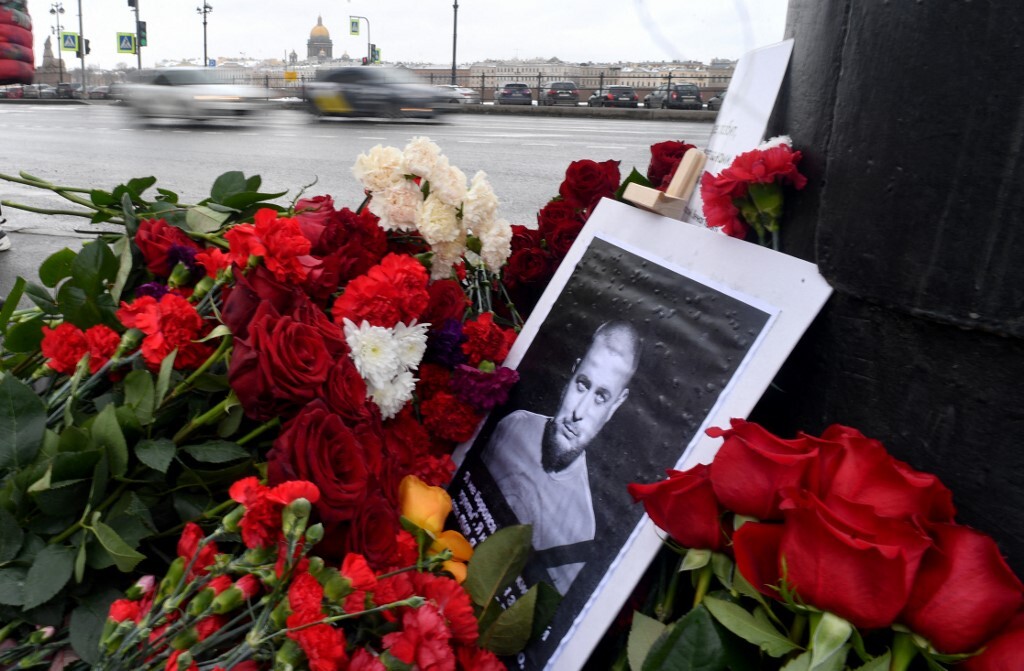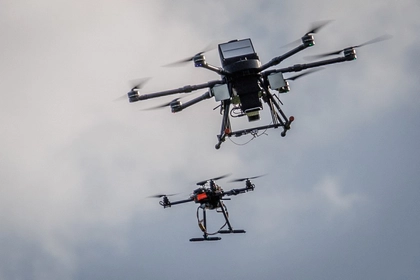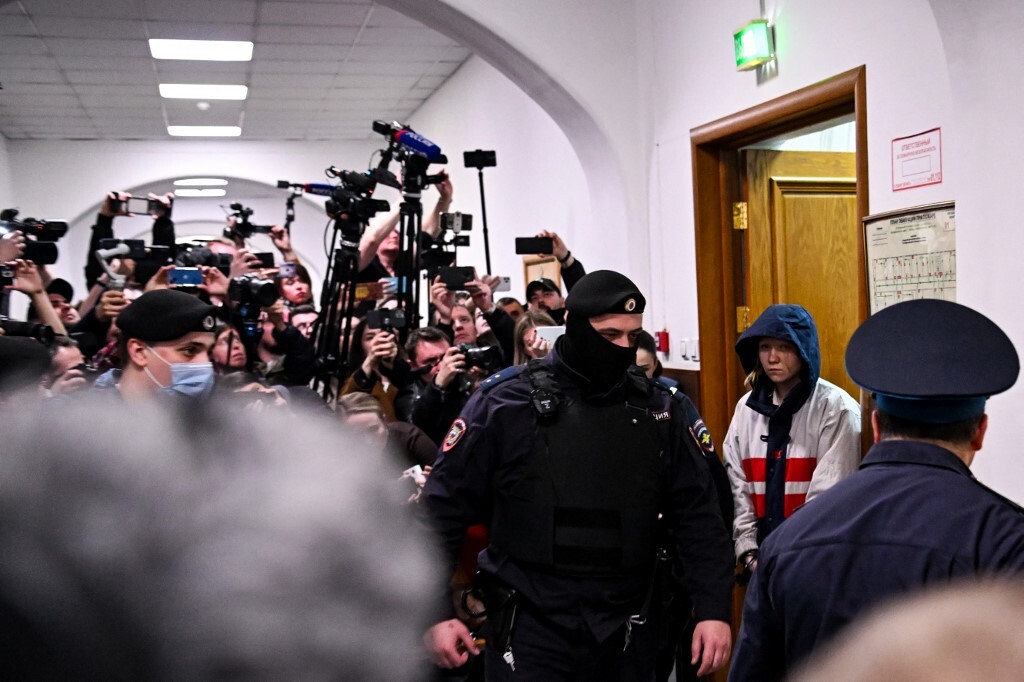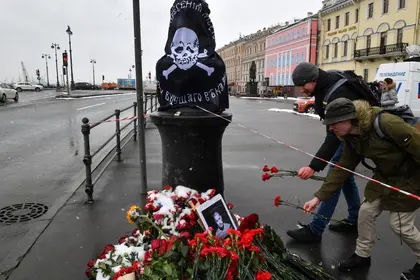Deadly political intrigue is rapidly building inside of a Russia that is increasingly burning out of control on Russian President Vladimir Putin’s watch. This past Sunday, in a St. Petersburg café purportedly owned by Yevgeny Prigozhin, pro-war Russian propagandist Vladlen Tatarsky was assassinated when a statuette he was gifted exploded. Prigozhin, meanwhile, in his capacity as head of the Wagner Group, was 1,000 miles away from the scene of the crime, lifting a flag over the Central Administration building in Bakhmut, Ukraine, declaring victory.
 Tatarsky, whose real name is Maxim Fomin, who was killed in the April 2 bomb blast in a cafe, is seen among flowers at a makeshift memorial by the explosion site in Saint Petersburg on April 3, 2023.OLGA MALTSEVA / AFP
Tatarsky, whose real name is Maxim Fomin, who was killed in the April 2 bomb blast in a cafe, is seen among flowers at a makeshift memorial by the explosion site in Saint Petersburg on April 3, 2023.OLGA MALTSEVA / AFP
Like an Agatha Christie mystery novel, the Russian red herrings are dropping fast and furious as to who murdered Tatarsky and why. Prigozhin, because of his ownership of the café, is one suspect; and he certainly is an individual desiring, if not plotting, to be Putin’s king. For now, however, the Kremlin’s preferred prime suspects are imprisoned opposition leader Alexei Navalny and his Anti-Corruption Foundation (FBK) movement.
In support of that theory, the Russian Ministry of Internal Affairs identified Darya Trepova as a suspect and in a released interrogation video clip, the woman appears to admit bringing what was later estimated to be one pound of explosive TNT hidden in a statuette into Prigozhin’s café. Russia’s Anti-Terrorism Committee also claimed Trepova is an “active supporter” of FBK.

Ukraine Reportedly Strikes 4 Alcohol Distilleries in Russia in Drone Attacks
 Darya Trepova, charged with terrorism over the April 2 bomb blast in a cafe in Saint Petersburg that killed military blogger Vladlen Tatarsky (real name Maxim Fomin), is escorted inside the Basmanny district court for her remand hearing in Moscow on April 4, 2023.Kirill KUDRYAVTSEV / AFP
Darya Trepova, charged with terrorism over the April 2 bomb blast in a cafe in Saint Petersburg that killed military blogger Vladlen Tatarsky (real name Maxim Fomin), is escorted inside the Basmanny district court for her remand hearing in Moscow on April 4, 2023.Kirill KUDRYAVTSEV / AFP
In addition to multiple suspects, notwithstanding the fact that Ukraine could be one as well, there is no shortage of motives either. St. Petersburg, after all, is in the heart of what we previously described as Putin’s “Murder Inc.” One motive could be Putin sending a loud message to Prigozhin to back off. The Wagner Group leader recently hinted that he could be a candidate to take over once Putin is gone.
This comes on top of Prigozhin’s increasingly vitriolic war of words with Russian Defense Minister Sergei Shoigu over his handling of the war. For now, there is a mutual need for each other between Putin and Prigozhin, especially in Bakhmut and Wagner Group operations in Africa. However, the love between “Putin’s chef” and Putin is long since gone. Short of killing Prigozhin, this may have been Putin’s Godfather-like way of putting a horse’s head in his bed as a final warning.
Putin is also continuing to feel the domestic heat over his faltering “special military operation” in Ukraine as Russian casualties mount. To that end, while Navalny thus far has been a useful domestic pawn to demonstrate to the Russian public that he is fully in control, Putin might have decided the opposition leader’s usefulness to him is coming to an end. If so, it is possible the Federal Security Service of the Russian Federation (FSB) orchestrated the hit on Tatarsky to set Navalny and other members of the FBK on murder charges, thereby eliminating threats to Putin if they result in death sentences.
Then there are the pro-war Russian military correspondents and milbloggers to consider – of which Tatarsky was one. Being “pro-war” in Russia is not necessarily the same as being “pro-Putin.” As Russian media expert and prolific Daily Beast writer Julia Davis noted last October, “Military correspondents and bloggers reportedly being investigated: Igor Strelkov (Girkin), Semyon Pegov (WarGonzo), Yuri Podolyaka, Vladlen Tatarsky, Sergey Mardan, Igor Dimitriev, Kristina Potupchik, as well as authors of Grey Zone and Rybar.”
Putin, via the FSB, may have just sent all of them a bloody message by killing Tatarsky to get fully onboard with his management of the war. Initially, as Killian Bayer Riga aptly speculated in DW, Putin’s use of Russian war bloggers likely were a “part of a political ploy” for the Russian president to politically deflect criticism of the Kremlin’s military setbacks in Ukraine onto an underperforming Russian Defense Ministry. Now, however, given Russia is facing an imminent Ukrainian spring counteroffensive in the Donbas and/or Crimea that could prove politically humiliating to Putin, Tatarsky’s assassination might have been a forewarning not to criticize the Russian president over any future setbacks.
There are two other possibilities. It could be a combination of one or two of the above, or it could well be Ukraine was behind it so as to foment a domestic divide inside of Russia. The brutal murder of close Putin ally Alexander Dugin’s daughter, Darya Dugina, in Moscow remains unsolved and Russian propagandists, including Margarita Simonyan, the head of state-controlled RT, were quick to blame Kyiv. Ukraine, in light of Russian war crimes in Bucha and elsewhere, as well as the kidnapping of Ukrainian children, certainly could have been motivated to take out the pro-Putin “ultranationalist.”
Whoever murdered Tatarsky is likely to remain as Winston Churchill famously said: “a riddle wrapped in a mystery inside an enigma.” Putin, however, one way or the other, is central to the plot. If Christie were writing this as a modern-day crime novel, she would have likely entitled it “Murder at Café Putin.”
The views expressed in this opinion article are the authors’ and not necessarily those of Kyiv Post.
Copyright 2023. Mark C. Toth and Jonathan E. Sweet. All rights reserved.
Mark Toth is a retired economist and entrepreneur who has worked in banking, insurance, publishing, and global commerce. He is a former board member of the World Trade Center, St. Louis, and has lived in U.S. diplomatic and military communities around the world, including London, Tel Aviv, Augsburg, and Nagoya. Follow him on Twitter @MCTothSTL.
Jonathan Sweet, a retired Army colonel, served 30 years as a military intelligence officer. His background includes tours of duty with the 101st Airborne Division and the Intelligence and Security Command. He led the U.S. European Command Intelligence Engagement Division from 2012-14, working with NATO partners in the Black Sea and Baltics. Follow him on Twitter @JESweet2022.
You can also highlight the text and press Ctrl + Enter






